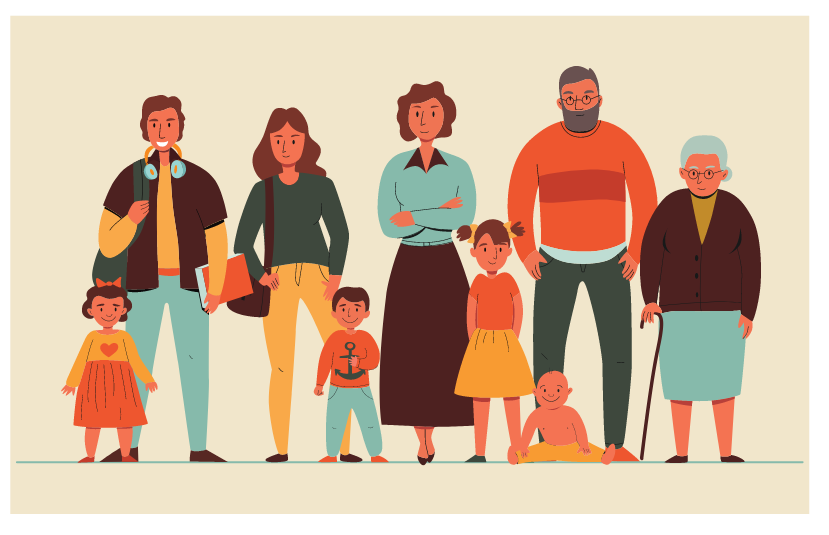Generational Trauma impact on mental health
Introduction
Generational trauma refers to a cycle where trauma passes through families via biological, environmental, psychological, and social means, impacting mental health conditions like anxiety, depression, and PTSD [1].
Groups affected by this intergenerational trauma include Black Americans, Holocaust survivors, and Indigenous communities [1].

Traumatic events like abuse, discrimination, and war can lead to epigenetic changes transmitted across generations, influencing the mental well-being of future generations [1] [2]. Understanding generational trauma’s profound impact on mental health is crucial for healing and breaking this cycle [2] [3]
What is generational trauma?
Generational trauma, also known as intergenerational or transgenerational trauma, refers to the passing down of traumatic impact and emotional fallout from one generation to the next [4] [1] [3].
It is a cycle where trauma is transmitted through biological, environmental, psychological, and social means, affecting the health and well-being of individuals across successive generations [1].
Some key aspects of generational trauma include:
- Causes: Traumatic events like abuse, discrimination, natural disasters, racism, war, and other collective traumas can lead to epigenetic changes that get passed down generationally [1].
- Affected Groups: Groups that have experienced collective trauma, such as Black Americans, Holocaust survivors, Indigenous communities, and refugee populations, are more susceptible to generational trauma due to factors like discrimination, prejudice, and lack of access to healthcare [1] [4].
- Manifestations: While there is no specific diagnosis for generational trauma, mental health screenings and assessments can identify related conditions like anxiety, depression, and PTSD [1].
Adverse Childhood Experiences (ACEs) are closely linked to generational trauma. ACEs refer to abuse, trauma, or neglect that creates toxic stress in a child’s brain, which has been linked to various physical and mental health issues as an adult [5].
These ACEs can be passed down from generation to generation, creating a vicious cycle [5]. Nearly half of all children in the U.S. have at least one ACE, and the prevalence is even higher (91%) among children in foster care by age 6 [5].
Signs and Symptoms
Generational trauma can manifest in various ways, impacting an individual’s mental and emotional well-being. Common signs and symptoms include:
- Emotional numbness, unresolved grief, isolation, hypervigilance, and fearfulness [4]
- Memory loss, anger, nightmares, inability to connect with others, and lack of trust [4]
- Substance abuse and recurring thoughts of death or suicide [4]
In children and teenagers, signs may include disciplinary issues, poor academic performance, cutting classes, and dropping out of school [4].
At the family level, dismissing feelings as ‘weakness’, over-protectiveness, flat emotional responses, wariness of outsiders, and frequent conflicts can be observed [4].
Other potential signs and symptoms encompass:
- Lack of self-worth, anxiety, depersonalization, and depression [1] [8]
- Dissociation, difficulty forming relationships, feelings of shame and guilt [8]
- Mood regulation issues, heightened stress response, and loss of sense of self [8]
- Impaired life skills and PTSD symptoms [1] [6]
- Potential impact on the immune system [1]
Children of trauma survivors can intuitively sense their parents’ fear and anxiety, causing them to experience the world as dangerous even without direct exposure [2].
The impact on mental health
The impact of generational trauma on mental health can be severe and far-reaching. In Afghanistan, where 85% of the population has witnessed at least one traumatic event, one in every two Afghans suffers from psychological distress [3].
Factors contributing to intergenerational trauma in the country include the effects of war, conflict, regime change, the COVID-19 pandemic, and socio-economic instability [3].

- Psychological Distress: Generational trauma can lead to various mental health issues, such as anxiety, depression, PTSD, and emotional numbness [1] [4] [8]. Children of trauma survivors may experience the world as dangerous, even without direct exposure, due to their intuitive sense of their parents’ fear and anxiety [2].
- Impaired Functioning: Individuals affected by generational trauma may struggle with memory loss, anger, nightmares, lack of trust, and difficulty forming relationships [4] [8]. These challenges can impair their ability to function effectively in personal and professional spheres.
- Physiological Impact: Generational trauma has been linked to potential impacts on the immune system, heightened stress response, and dissociation [1] [8]. These physiological effects can further exacerbate mental health issues and overall well-being.
To break the cycle of generational trauma, it is crucial to identify and treat Adverse Childhood Experiences (ACEs) as soon as possible, ideally before young people have children of their own [5]. This early intervention can help prevent the transmission of trauma to future generations and promote healing.
Healing and Breaking the Cycle
Healing from generational trauma is a journey that requires a multifaceted approach. Educating people about the cycle of trauma and providing support through therapy, community resources, and cultural connections can help break this cycle [1]. Treatments may include:
- Psychotherapy: Approaches like cognitive-behavioral therapy, EMDR, and trauma-focused therapy can help process and cope with the trauma [1].
- Coping Strategies: Mind-body practices like mindfulness, yoga, and expressive arts therapies can aid in reframing damaging narratives and building self-compassion [2].
- Culturally Competent Care: Mental healthcare that recognizes the person’s cultural background, needs, and unique experiences of affected communities is crucial [1] [2].
Preventing generational trauma involves educating people about it and providing resources like:
- Support groups
- Financial assistance
- Housing support
- Healthcare access
- Education opportunities
- Individual therapy [1]
Addressing the sources of trauma through activism and advocacy can also help break the cycle [2]. Building awareness, practicing positive parenting, and fostering open communication within families are key healing strategies [2] [6].
To begin healing, one should:
- Identify the trauma and its impact on their life and family [6].
- Cultivate empathy and compassion for oneself and others [6].
- Seek guidance from trauma-informed providers for therapy [6].
- Recognize that healing is attainable, even though generational trauma can feel deeply ingrained [6].
Healing intergenerational trauma takes time and may require relating to loved ones in new ways, reclaiming lost traditions, and engaging in collective action [7]. The goal is to make different choices than previous generations and disrupt the cycle of pain [7].
Self-care strategies
Engaging in self-care practices can play a vital role in managing the effects of generational trauma on mental health. It is crucial to prioritize self-care activities that promote emotional well-being, such as regular exercise, adequate sleep, healthy eating, and relaxation techniques like deep breathing or meditation.
Additionally, engaging in activities that bring joy and fulfillment, such as hobbies, spending time in nature, or connecting with loved ones, can contribute to overall well-being.
Seeking support from trusted individuals, participating in support groups, and setting boundaries to protect one’s mental health are also important self-care strategies. Remember, self-care is a continuous process, and finding what works best for you is key.

Conclusion: Breaking the cycle and promoting mental well-being
Generational trauma can have a great impact on mental health, but it is not an inevitable cycle. By understanding the link with mental health, recognizing the signs and symptoms, seeking professional help, and engaging in self-care practices, individuals can break free from negative patterns and promote their mental well-being.
Healing from trauma is a complex journey that requires patience, support, and resilience. By breaking the cycle of trauma and cultivating a nurturing environment, we can pave the way for future generations to thrive in good mental health.
Related post
Reference
[1] – https://www.health.com/condition/ptsd/generational-trauma
[2] – https://www.washingtonpost.com/wellness/2023/06/12/generational-trauma-passed-healing/
[3] – https://www.ncbi.nlm.nih.gov/pmc/articles/PMC10097044/
[4] – https://michaelgquirke.com/recognize-these-intergenerational-trauma-signs-symptoms/
[5] – https://iuhealth.org/thrive/generational-trauma-breaking-the-cycle-of-adverse-childhood-experiences
[6] – https://www.transformationsnetwork.com/post/breaking-generational-trauma
[7] – https://www.latimes.com/lifestyle/newsletter/2023-12-12/how-we-can-break-the-cycle-of-intergenerational-trauma-group-therapy
[8] – https://www.menshealth.com/health/a43392391/signs-of-generational-trauma-according-to-therapists/

